- Home
- Randall Farmer
All Conscience Fled (The Good Doctor's Tales Folio Two) Page 12
All Conscience Fled (The Good Doctor's Tales Folio Two) Read online
Page 12
Their interpretation was obvious. The authorities kept me under guard at the Detention Center, but treated me well. Unfortunately, Transform Sickness craziness eventually took over my mind and I escaped. The first thing I did was kill someone. A psychopath now, I followed the same homicidal path as Keaton.
The article was virulent. The writer didn’t consider me human any more, nor made any attempt to understand why I would do what I had done. Instead, they assumed I had lost my intelligence somewhere along the way and been reduced to a mindless animal. A small red-tinted box followed the main article, some editor espousing the position that the authorities should have killed me outright when I made my transformation.
Dr. Zielinski came off just as bad, the writer comparing my juice draws – those hopeless Transforms facing juice withdrawal – to human experiments from World War II by the Nazis. Dr. Zielinski appeared to be about to lose his medical license.
The conclusion was inescapable. The authorities would let the next Arm they got their hands on go into withdrawal.
The author quoted Agent McIntyre, who had survived his knife wounds. He went on at length about the dangers of Arms. He expected me to go on a killing spree, just like Keaton, the nurse just the first of many. As far as I could tell, he came out of the scandal smelling like a rose.
They talked about my family. They talked about the normal person I was before I came down with Transform Sickness. Someone had gotten to Bill, and quoted him in the article. He sounded lost. “I don’t see how she could be killing anyone. That just isn’t something Carol could ever do.” They didn’t mention the fact he divorced me while I remained imprisoned in the Detention Center.
The article talked briefly about the manhunt out searching for me. Somehow, Keaton had convinced them I lived somewhere in California. I didn’t know how.
The article made no mention of Keaton being involved in my escape. Unbelievable, especially given amount of effort the authorities expended investigating my escape. I guessed everyone involved had a personal interest in keeping that dirty little detail quiet.
Keaton’s only mention came in a separate article reviewing her history, an interesting read. Except for a few short articles I read back in the Detention Center, I knew nothing about Keaton’s past. The article talked about several manhunts and close escapes, and a lover she traveled with for several months, killed during an attempt to capture her. The article listed her worst offenses, including multiple murder charges, rape, several cases of torture slayings, and a whole assortment of other things, including one charge of cannibalism.
I glanced up at Keaton, seated across from me and working through her third helping of the scalloped potatoes. “Hmm,” she said. “Just after I escaped, I got a little excessive.” I swore she sounded embarrassed. Good. Cannibalism wasn’t something I wanted her to still be doing.
Or, come to think of it, something she thought she needed to teach me.
After I cleaned up dinner, Keaton began to teach me a new way to fight, a form of martial arts she used. She didn’t give this bastardized mix of multiple martial arts techniques a name; but years later this martial arts form would be labeled the ‘Flowing Arm School’, about as good a description as any. As part of this, I started learning to throw a knife.
The next day, Keaton led me back to her workroom to teach me a bunch of new robbery skills: how to pick a simple lock, how to case out a residence, how to enter, how to recognize window locks, multiple-lock doors, tricks such as the piece of wood to prevent a sliding glass door from opening, and where to search for valuables. Or anyway, she started to teach me. After a couple of hours of talk and practice, Keaton decided real experience would be the best teacher. More theory on the subject would come later.
Keaton had me try out my new skills on a quiet urban house. She let me handle the break-in. I sweated, despite the cold. Keaton and I both wore white overalls and carried large toolboxes. Keaton led us around to the back, past empty flowerbeds and neatly trimmed boxwoods. She eyed me, expectantly.
First, I checked the back door. The lock was a good one and not one I knew how to pick. I left it, and checked the windows. The best ones turned out to be a couple small living room windows, looking out into the back yard. I carefully removed a screen and lifted the sash on the window. Or tried to. Locked. I went to the other one and removed the screen. Locked as well.
Keaton wore a disgusted expression on her face; somehow, I had screwed up already. I would be damned if I knew how, though.
I tapped on the window. No dog came to investigate. I tried to think of what I should be doing with windows locked on the inside. I couldn’t think of any way to open the locks from the outside.
Oh, right. This was a robbery. I took the hilt of the handgun Keaton made me carry and smashed in the window. The window broke with an unnerving amount of noise. I reached in, unlocked the window, raised it up and climbed into the house through the window.
Keaton met me on the inside. The owners had left the back door unlocked.
Damn.
The house wasn’t luxurious enough to require maids, but on the other hand, the place wasn’t a typical run-down urban house, either. I saw no sign of inhabitants. The owners were out and, from the pictures on the fireplace mantle, their children were grown and gone.
A Christmas tree sparkled in the living room, a beautiful thing, trimmed with painted glass balls and handmade ornaments of all sorts. Some were elegant and expensive, but many appeared to be hand-made by small children. There was a star made of pipe cleaners, a ball made of macaroni noodles painted red, and, right in the center, a curling piece of paper with a holly wreath drawn on it, and the words ‘I love Grandma’ written in unsteady letters in the center.
I turned away, annoyed. I had other priorities here.
The house was expensive and clean, tastefully decorated in a dated Depression-era style. The carpets were gray and small wooden tables nestled in corners, all covered with pictures and knick-knacks. A mantle-clock chimed the quarter hour as I examined the place. None of the knick-knacks appeared to be valuable enough to be worth taking.
I searched the rest of the house, just as Keaton had told me, with Keaton following after and silently observing. On the bedroom bureau, crowded in among pictures of grandchildren, I found a jewelry box, which I emptied into my toolbox. I wore thin gloves, so I left no fingerprints. I emptied all the drawers, and I found a small box containing a pair of tiny diamond earrings, underneath the men’s underwear. Grandpa’s Christmas present to Grandma.
I found a small office next to the master bedroom, the desk cluttered with papers and pencils, correspondence and a copy of Accountant’s Digest. Grandpa had a second telephone in this room, sitting big and black beside a couple of books about statistics and an array of kid pictures. The one next to the phone showed a small child, no more than a year old, climbing over an upended knick-knack table. Fallen knick-knacks surrounded her, and she wore a smile of pure delighted pride at her magnificent accomplishment.
She looked like my daughter Sarah at that age.
I shook my head, trying to shake out the memories. I couldn’t afford memories of my former life. I searched through the drawers of the desk, but found nothing worth taking.
A small file cabinet sat next to the desk; I checked and found it locked. I went back through the desk, carefully avoiding any chance glance at the picture, and grabbed a key from the rear of the middle drawer. It unlocked the file cabinet. The top drawer contained an envelope holding a little over $80. The other drawers contained a variety of papers, important to Grandma and Grandpa, but useless to me.
I found more productive loot in the elegant dining room. They had a set of sterling in the china cabinet, in among the linens and plates. The sterling went into my toolbox. The china looked expensive, too, but I didn’t see any way of taking it. I went looking through the display cabinet and found some expensive hand-cut crystal. I wrapped the crystal in some cloth napkins before I took it. I also fou
nd some antique-looking Wedgwood, and some porcelain so thin it had to be worth something. The rest of the things in the cabinet appeared to be junk.
I didn’t find anything else in the house. I turned to Keaton and indicated that I was done. Keaton snorted in disgust.
She went through the house, a master at work. She went through places I didn’t think to search and found valuables. She went through places that I had already been through and found more. She turned up another small jewelry box in the master bedroom closet. She found government bonds in the file cabinet. She excavated dozens of Christmas presents, most of which weren’t worth taking. She found a supply of sterling serving dishes in the kitchen, and a small gold-plated sugar bowl.
When she finished looting the house, she took one of the dining room chairs and swung it into the display cabinet. It broke with a crash of shattered glass. Water goblets and painted plates fell and smashed. Keaton grinned, and did it again. Then she turned to me and raised her eyebrow, and so I did the same thing.
I felt a bit bad for Grandma and Grandpa, but, well, I did worse to people when I killed. These folks would at least live through this.
We broke nearly everything breakable and ruined most of the rest. Keaton laughed as she destroyed things and enjoyed herself immensely. I had never seen her have so much fun. I wouldn’t have thought her capable of it. I tried to imitate Keaton, of course. I tried to enjoy the destruction with the same wild abandon. It was a strange sensation, destruction for the sake of destruction. Liberating, in a way.
Keaton destroyed the china cabinet and display case. She pulled down the Christmas tree, and dumped the kitchen china on the floor. I kicked over little knick-knack tables and took pictures off the wall and threw them across the room. Keaton took a kitchen knife and slashed holes in the sofa and cushions. She smashed in the television screen, which I didn’t realize was possible. It broke like thunder. She cracked the mirrors in the bedroom. I took everything out of the refrigerator, and dumped it on the floor. Keaton took the vegetable oil from the cabinet, and poured it out all over the living room furniture. I took honey from the cabinet, spread it all over the master bedroom, and then spread sugar on top of the honey. I made a special point of destroying the picture of the little girl who looked so much like Sarah.
Keaton laughed as she worked. She smashed things, she destroyed things, and she made an unbelievable mess. I laughed, too. If Keaton thought this was fun, of course I thought this was fun, too.
Destruction does have its appeal.
Keaton went over our robbery with me after we returned to the warehouse. She went over every detail of what I did, as well as possibilities for other circumstances, and what dangers and risks deserved worry. She lingered longest over my mistakes, of course.
After the discussion of the robbery, she turned the conversation into one of those nasty analysis sessions. She wanted to talk about our orgy of destruction after we looted the place. “What do you think about what you did?” she asked. “You said it made you feel bad for the people who lived there. Bad how, exactly?” “That couple whose house we vandalized are going to be traumatized by what we did. Where’s your guilt?” “So you feel only mild guilt. What does that say about you?” “No, no. You’re dodging my question. Dig a little deeper.” “So you think you may be turning into something a little less than human. That’s an interesting line of thought. Why don’t you carry it further? I would like to hear you expound on that thought at length.”
She went on for hours. For something involving no physical pain, the session was damned unpleasant.
(10)
“Time to go hunting for juice,” Keaton told me, two days after the robbery. “Given how pathetic you are at hunting, dipshit, you’re going to need the extra time.” Bored with the robbery lessons, I guessed. “This time you keep up on your eating and exercise, or you’re going to be paying in blood.”
Hunting on my own remained an unnerving experience, but easier this time, as the freedom from Keaton’s control didn’t feel so unnatural. I hunted Chicago for two days; although I found a potential kill late on the second day, he got away from me. I spotted him commuting home on the El, and he went out of my range almost as soon as I spotted him. I followed after and tried to locate him again, but I had no luck. I spent many frustrating hours trying to track him down before eventually giving up. The next day we went to Detroit. I spent a day there and found nothing. I found nothing in Cleveland the next day, either.
After finding nothing in Cleveland, I wanted to go back to Chicago. Instead, Keaton showed me a small article from the Chicago Tribune. The man went into withdrawal in one of the Chicago suburbs. He killed his wife and two children, and his neighbor’s wife and their dog before police shot him.
Talk about an appalling waste! He could have been mine, but, instead, he killed half his neighborhood. The world would have been a better place if I killed him first.
I followed my orders: on to Buffalo, now starting to feel the effects of low juice.
---
I hungered for juice.
I hunted for juice.
I hunted in a car, the only proper way to hunt. I exited off the thruway and turned west on I190, in toward the center of Buffalo. I started my real hunt on the surface roads.
I found a Transform almost immediately. A tagged Transform. My juice monkey almost got to me; I almost succumbed to the urge to take the guy despite Keaton’s orders.
I drove on, steamed, annoyed, little tendrils of ‘go ahead, do it anyway’ playing in my head, an accordion song of stupidity. When the juice monkey’s song got too bad, I recalled orgasms. My memory games got old when I spotted the next Transform from the Focus’s household driving by in a car, two more at another bus stop, and then the whole goddamned household of the Focus’s Transforms. They lived poor, all crammed together in a smallish ghetto tenement apartment building little larger than a cockroach motel.
Seeing the Focus and all those Transforms together drove the lure of them out of my mind. Keaton was right, Transforms were easier to resist in numbers. Still, I did take a five minute break when I got out of their sight to work out the kinks in my muscles and fight off the urge to follow one of the Focus’s Transforms ‘just for fun’.
The world of the Arm had too many damned – and damning – temptations.
The bozo factor is another constant annoyance, almost as bad as my juice monkey.
“Hey, you, stop.” I was on the way out of some office building at the corner of Huron and Niagara, minding my own business, my mind lost in the hunt. I turned and saw a man stride toward me, potbelly hanging over his black pants, blue shirt emblazoned with ‘Security’.
“Yes?”
“Come with me, now!”
I came, following Keaton’s plan for such a situation: no violence unless someone tries to subdue you. Pot Belly led me down a stairwell, down past the first floor…and one of Keaton’s contingency plans ripped through my brain. This was no security guard. I faced being mugged, raped or worse.
I had discovered the perils of being a factory-laborer woman out alone, looking like bait, not looking like someone who belonged, such as a secretary.
Was I scared?
Sure.
“Into my office,” he said. He grabbed my upper left arm and pushed. I went; his office stank of fuel oil, several tanks of which were in plain sight. A generator or something mechanical growled around the corner.
If this was an office, my name was Lyndon Johnson.
More contingency plans. ‘Around flammables, knives only,’ Keaton said, so my pistol would stay in my shoulder holster.
Instead of falling, I faked a stumble. When I righted myself, I dropped my purse and took out my knives.
Potbelly pulled a gun, so I moved quickly. I went for his gun arm, stabbed, and then took his gun from his now bleeding and useless right arm. He blinked in disbelief; normals didn’t move as fast as an Arm. Then potbelly tried to slug me.
Options whirred
through my head, none of them good…until they vanished, as the battle lust washed over me. I cut, I lost the knife, I got slugged, I slugged back. He muttered as he fought, scared as I was. He thought I was a man disguised as a woman. I popped him one in the jaw and left my second knife in his leg. He grabbed me and panic set in: Keaton would kill me for this. My combat skills needed more practice.
My battle lust helped, though, because when I panicked I got fast. I got out of his grip in a slippery moment; I put a knee in his balls the next. I followed with a right cross to his neck, followed by a martial arts move to put air under his heels. The man flew across the room and landed with a sodden thump. I approached, wary, but he didn’t move. I froze, ready to act. He still didn’t move, and my combat lust ebbed away.
Keaton’s orders in this circumstance? Kill the mook. My body shook in the aftermath of the battle lust as I contemplated her words. I wasn’t a killer in cold blood. Not really. Keaton expected such, though. I closed my eyes and thought through my options. What would be worse, killing someone in cold blood or disobeying Keaton? I could have debated this dilemma for hours, but right then I realized there was something I didn’t hear: Pot Belly’s heartbeat.
He was already dead. I had killed him in the fight.
I stood up straight and took a deep breath, coming down from the last of my battle high. Killing an attacker in a fight disconcerted me, but only for a moment. I was no longer the mousy housewife I had been before I became an Arm. He attacked me. He deserved what he got. I hoped.
I took another deep breath and surveyed the room. The place looked like some sort of combination storage space and workroom, with equipment cages, drums of supplies, metal shelving, a cluttered workbench, various machinery, and of course, the tanks of fuel. I found five places to stash the corpse, where no one would find it until the corpse began to stink. I used my ridiculous muscles, levered the rapist-mugger behind a horizontal fuel-oil tank and brushed my hands off afterwards.

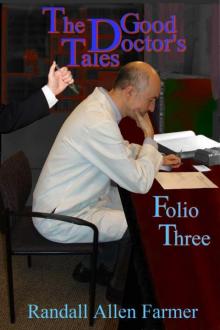 The Good Doctor's Tales Folio Three
The Good Doctor's Tales Folio Three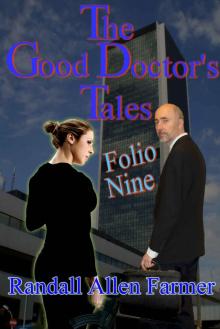 The Good Doctor's Tales Folio Nine
The Good Doctor's Tales Folio Nine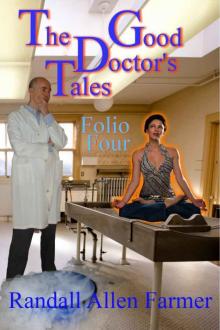 The Good Doctor's Tales Folio Four
The Good Doctor's Tales Folio Four An Age Without A Name (The Cause Book 5)
An Age Without A Name (The Cause Book 5) In this Night We Own (The Commander Book 6)
In this Night We Own (The Commander Book 6)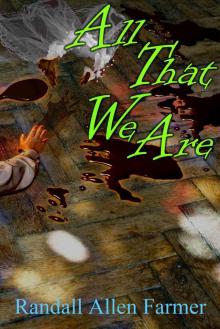 All That We Are (The Commander Book 7)
All That We Are (The Commander Book 7)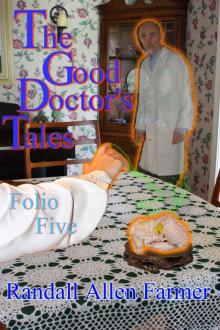 The Good Doctor's Tales Folio Five
The Good Doctor's Tales Folio Five An Age Without A Name
An Age Without A Name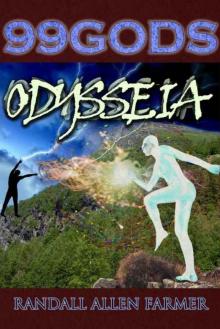 99 Gods: Odysseia
99 Gods: Odysseia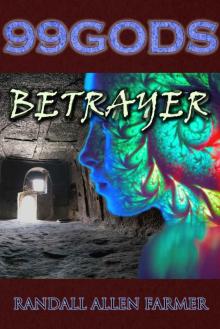 99 Gods: Betrayer
99 Gods: Betrayer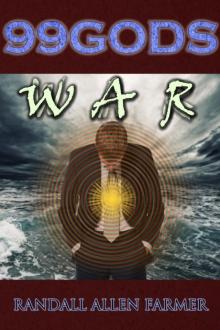 99 Gods: War
99 Gods: War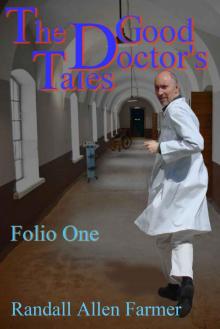 The Good Doctor's Tales Folio One
The Good Doctor's Tales Folio One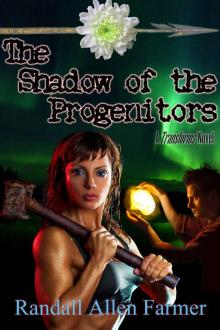 The Shadow of the Progenitors: A Transforms Novel (The Cause Book 1)
The Shadow of the Progenitors: A Transforms Novel (The Cause Book 1) No Chains Shall Bind Me (The Good Doctor's Tales Folio Seven)
No Chains Shall Bind Me (The Good Doctor's Tales Folio Seven)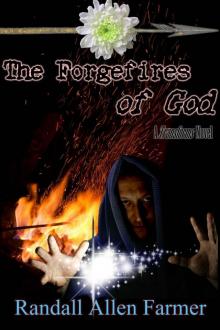 The Forgefires of God (The Cause Book 3)
The Forgefires of God (The Cause Book 3) All Conscience Fled (The Good Doctor's Tales Folio Two)
All Conscience Fled (The Good Doctor's Tales Folio Two)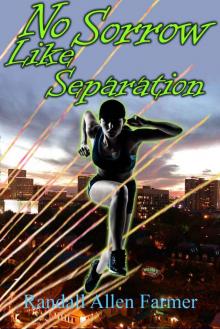 No Sorrow Like Separation (The Commander Book 5)
No Sorrow Like Separation (The Commander Book 5)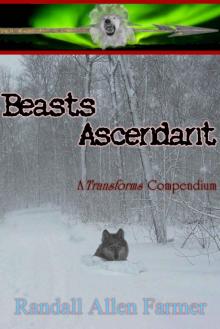 Beasts Ascendant: The Chronicles of the Cause, Parts One and Two
Beasts Ascendant: The Chronicles of the Cause, Parts One and Two The Good Doctor's Tales Folio Eight
The Good Doctor's Tales Folio Eight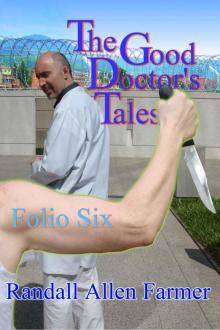 The Good Doctor's Tales Folio Six
The Good Doctor's Tales Folio Six Love and Darkness (The Cause Book 2)
Love and Darkness (The Cause Book 2)